“Our talent management processes are siloed, which is slowing down decision-making. How can we integrate everything into one platform for faster insights?”
Does that sound like you?
Let’s solve it by considering 20 tools that are built to simplify complexity—tools that streamline performance, bring clarity to people’s operations, and help teams move faster with less friction.
We didn’t just list the biggest names. We looked for platforms that solve real problems: misalignment, clunky workflows, poor visibility, and slow feedback loops. Whether you’re scaling fast, driving engagement, or tightening up processes, this list gives you a head start on finding a solution that fits.
Quick Comparison: 20 Leading Talent Management Solutions
These tools excel in areas like performance, onboarding, payroll, global hiring, and more. It doesn’t matter if you’re a startup or a big company; these platforms offer the talent management tools your team needs to succeed.
| Platform | Focus Area | Starting Price |
| Peoplebox.ai | Best-in-class platform for goal alignment, performance, and strategy execution | $7 per user/month |
| BambooHR | All-in-one HR platform for SMBs | Pricing varies; contact for details |
| Workday | Enterprise-grade HCM with deep analytics | Pricing varies; contact for details |
| UKG Pro | HR suite with payroll and workforce management | $27–$37 per employee/month |
| Cornerstone OnDemand | Learning, development, and performance at scale | $6 per user/month |
| ADP Workforce Now | Scalable payroll and talent tools for growing teams | Pricing varies; contact for details |
| iCIMS Talent Cloud | Recruiting-focused platform with enterprise reach | $1,700/month for 1–100 employees |
| JazzHR | Simple, affordable applicant tracking for SMBs | $75/month (Hero plan) |
| Lattice | Performance reviews, OKRs, and engagement surveys | $11 per user/month |
| Paycor | HR and payroll platform with talent management tools | $19–$27 per employee/month |
| ZipRecruiter | Smart recruiting and job distribution engine | Pricing varies; contact for details |
| Monday.com | Work OS with goal tracking and team alignment tools | $12 per user/month (Basic plan) |
| Gusto | Payroll + basic HR features for small businesses | $49/month + $6 per employee/month |
| Paylocity | Cloud-based HR and payroll with performance tools | Pricing varies; contact for details |
| Paycom | Self-service HR and talent management software | Pricing varies; contact for details |
| isolved | HCM suite with payroll, time, and performance | Pricing varies; contact for details |
| Workable | Hiring-focused platform with collaborative tools | Pricing varies; contact for details |
| Rippling | Unified platform for HR, IT, and finance workflows | $8 per user/month |
| Deel | Global hiring and payroll for remote teams | $49 per employee/month |
| Remofirst | Employer of record (EOR) solution for global teams | $199 per employee/month |
Tip: For platforms with changing prices or no public listings, contact the provider directly. This will give you the most accurate and current information.
Now, Let’s See the Details of these 20 TMS Platforms
No matter if you’re a startup or a growing business, these platforms provide the talent management tools your team needs to succeed.
1. Peoplebox.ai
Peoplebox.ai is a powerful talent management platform designed for fast-growing businesses. It helps connect workforce performance with company goals to drive better results.
With seamless integrations into everyday tools like Slack, Microsoft Teams, and Jira, Peoplebox.ai makes it easy to run performance reviews ,align on strategy, and boost team engagement all in one centralized platform.
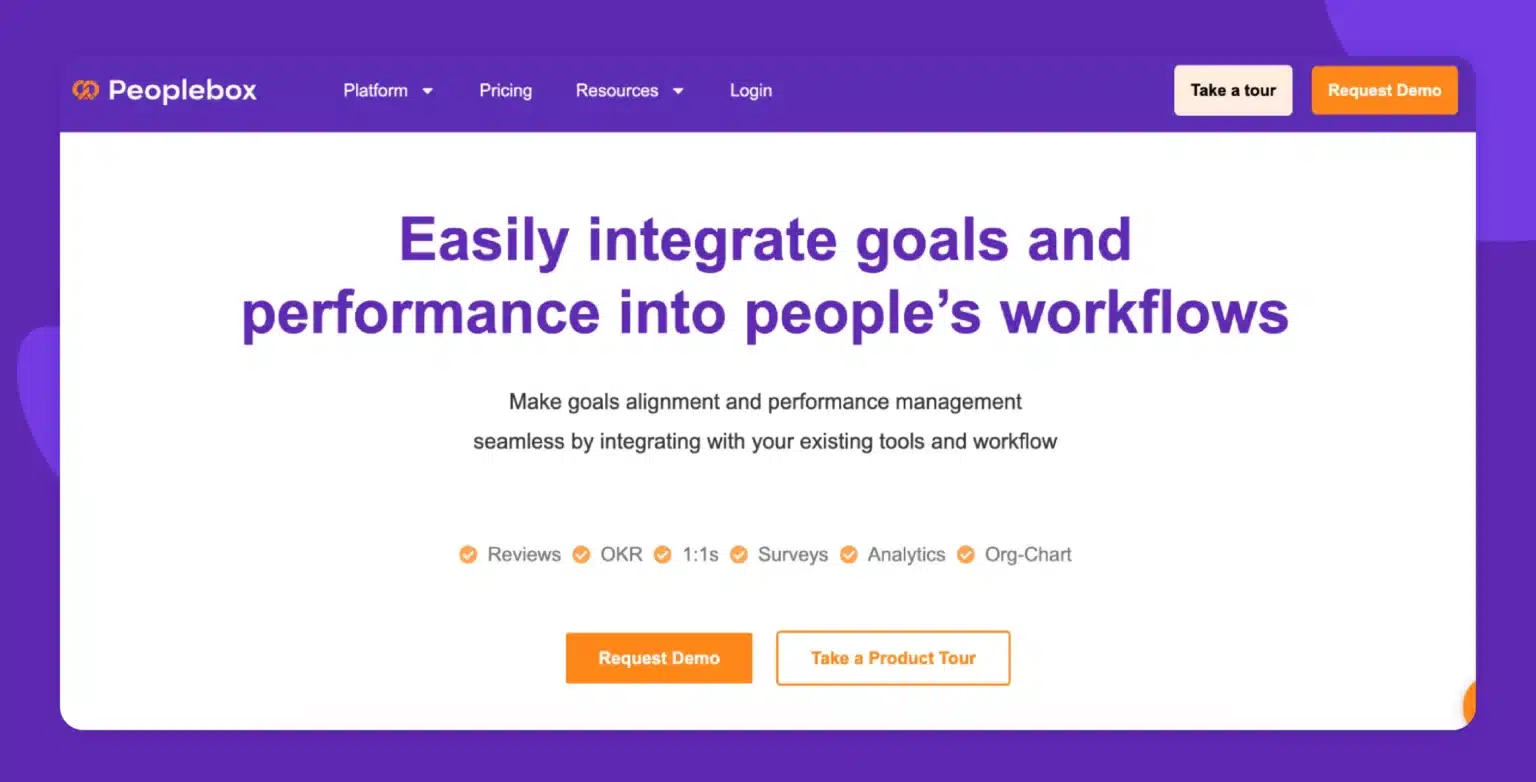
Key Features:
- OKRs & Goal Management: Helps set and track Objectives and Key Results (OKRs). This aligns individual and team goals with the company strategy.
- 1:1 Meetings & Continuous Feedback: Makes one-on-one meetings easier with clear agendas. It also allows for ongoing feedback between managers and employees.
- 360-Degree Performance Reviews: This tool provides customizable performance review cycles. It offers templates, real-time calibration, and automated scheduling and works within Slack or Microsoft Teams.
- Employee Engagement Surveys: Offers pulse surveys and tools to check employee happiness and find ways to improve.
- Advanced Analytics & Reporting: Provides real-time insights with dashboards and reports. This helps teams make informed decisions.
- Seamless Integrations: Integrates with over 100 tools, including Slack, Microsoft Teams, Asana, Jira, Salesforce, and various HRIS platforms.
User Ratings:
Ideal For: Organizations that want to improve how individual performance aligns with business goals. This is great for those needing a unified platform for goal management and tracking performance.
2. BambooHR
BambooHR is one of the most used talent management tools for small to mid-sized businesses. Known for its clean interface and ease of use, BambooHR helps HR teams get out of spreadsheets and into streamlined workflows.
It covers everything from hiring and onboarding to performance management. You can manage the employee experience all in one place.
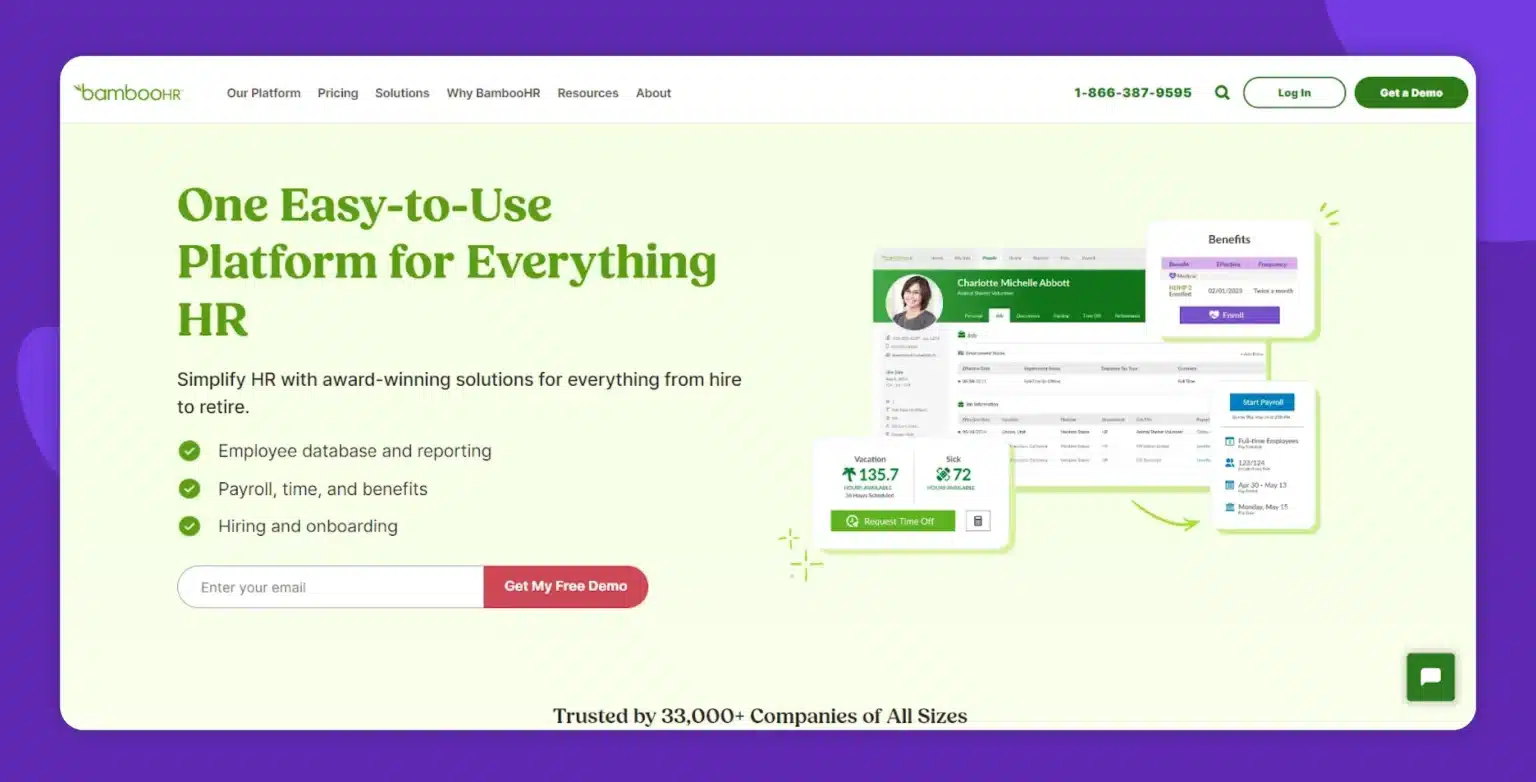
Key Features:
- Employee Records Management: Centralized digital employee files for easy access and updates
- Onboarding & Offboarding: Automated checklists, e-signatures, and welcome emails to simplify transitions
- E-Signatures: Quickly collect and manage important documents with legally binding e-signatures
- Performance Management: Lightweight tools for goal tracking, feedback, and employee evaluations
- Time Off Tracking: Self-service PTO requests and approvals
- Mobile App: Full access for managers and employees on the go
User Ratings:
Ideal For:
Small to medium-sized businesses need a simple, all-in-one talent management solution. They want something easy to use, without the hassle of complex enterprise software.
3. Workday
Workday is a talent management system used by many organizations for HR and performance needs. It’s designed for large companies needing strong features and detailed insights.
It is known for its top performance. It provides core HR, payroll, advanced analytics, workforce planning, and talent optimization. This makes it a top choice for global organizations that manage complex people operations.
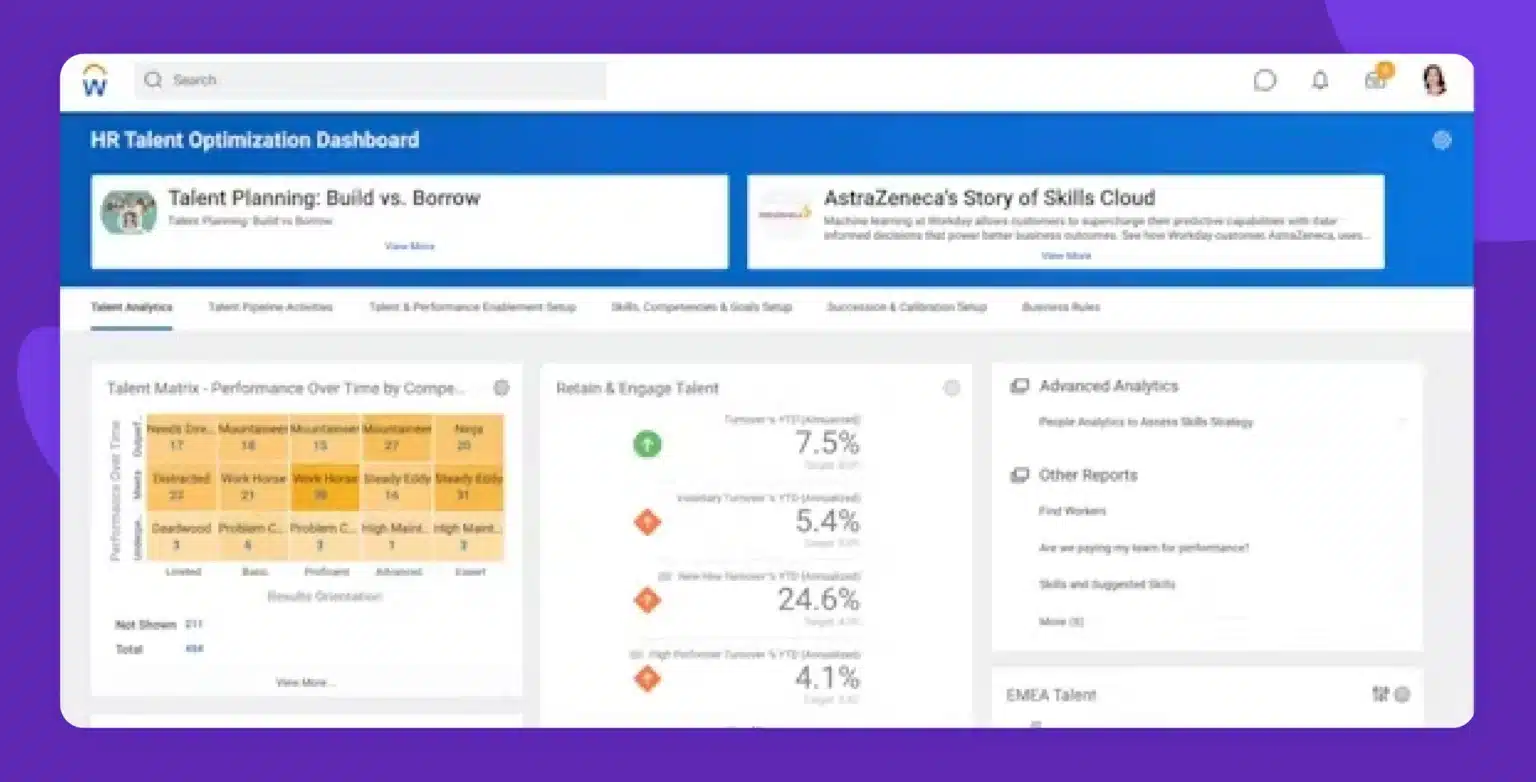
Key Features:
- Core HR & Payroll: Centralized HR records, global payroll capabilities, and compliance support
- Talent Management & Optimization: Tools for performance reviews, succession planning, and leadership development
- Workforce Planning: Forecast workforce needs and align talent with business goals
- Advanced Analytics: Real-time dashboards and predictive insights for smarter HR decisions
- Learning & Development: Custom learning paths and training programs
- Mobile & Self-Service: Empower employees and managers with mobile-first access to HR tools
User Ratings:
Ideal For:
Large organizations with complex structures and global reach need a robust talent management platform. It must offer strong analytics and the ability to scale easily.
4. UKG Pro
An all-in-one talent management system for growing organizations.
UKG Pro is built to help mid-sized to large businesses manage their people effortlessly. It combines HR, payroll, talent acquisition, and workforce management. All these features are in one smart, unified platform.
It offers strong analytics and customizable features. It focuses on the employee experience. This helps you streamline operations, improve decision-making, and create a people-first workplace.

Key Features:
- Talent Acquisition & Onboarding: We made hiring easier and added tools to help new employees start smoothly.
- Payroll & Timekeeping: Process payroll accurately and efficiently. Track time and attendance comprehensively.
- HR Analytics: Get advanced reports and insights to understand workforce trends and performance.
- Employee Self-Service: Empowers employees with access to personal information, benefits, and time-off requests through a user-friendly portal.
- Mobile Accessibility: Apps that let managers and employees handle HR tasks anywhere.
User Ratings:
Ideal For:
Mid-sized to large organizations want a talent management solution that can grow with them. This solution should integrate HR, payroll, and workforce management. It aims to boost operational efficiency and improve employee engagement.
5. Cornerstone OnDemand
Cornerstone OnDemand is a comprehensive talent management platform. It helps companies grow and support their teams at all stages. From learning and development to performance management and succession planning it’s all in one place.
It offers rich content libraries and smart analytics. This makes continuous learning easy. It also helps leaders make better, data-driven decisions that match business goals.
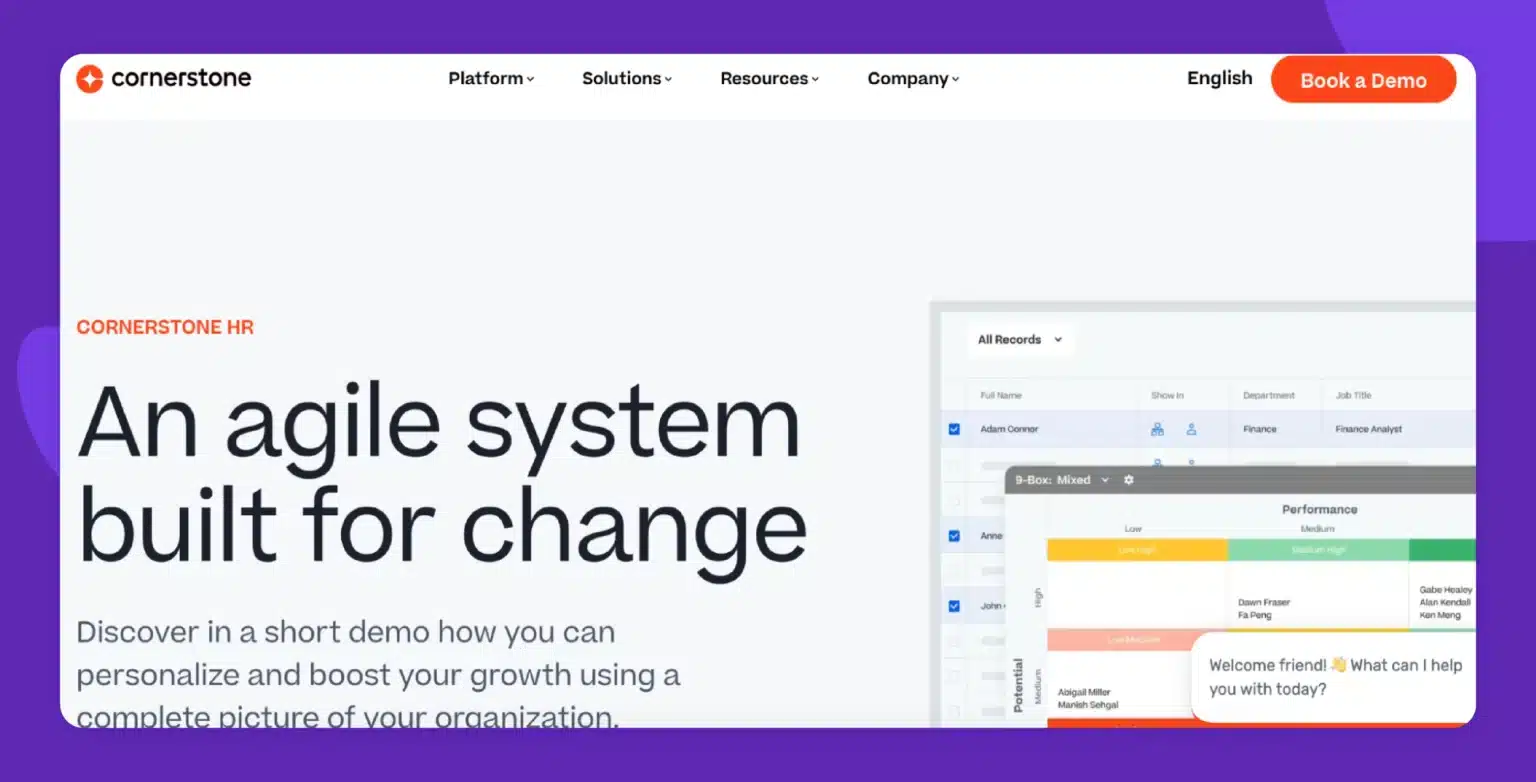
Key Features:
- Learning Management System (LMS): Offers scalable training programs. It provides a wide range of content to help with employee development.
- Performance Management: Helps set goals, conduct reviews, and provide ongoing feedback. This boosts employee engagement and productivity.
- Succession Planning: Identifies and prepares future leaders through strategic talent pipelines.
- Content Libraries: Provides access to a wide range of learning materials to support diverse training needs.
- Analytics and Reporting: Provides insights into learning results and performance metrics. This helps guide strategic decisions.
User Ratings:
Ideal For:
Organizations that focus on employee growth need a strong talent management solution. This will help with learning, performance, and succession planning.
6. ADP Workforce Now
ADP Workforce Now is an all-in-one talent management system. It helps businesses of any size simplify HR tasks. This includes payroll, hiring, performance, and benefits.
It has smart features and scalable solutions. It meets the fast-changing needs of modern HR teams. Plus, it keeps everything running smoothly on one unified platform.
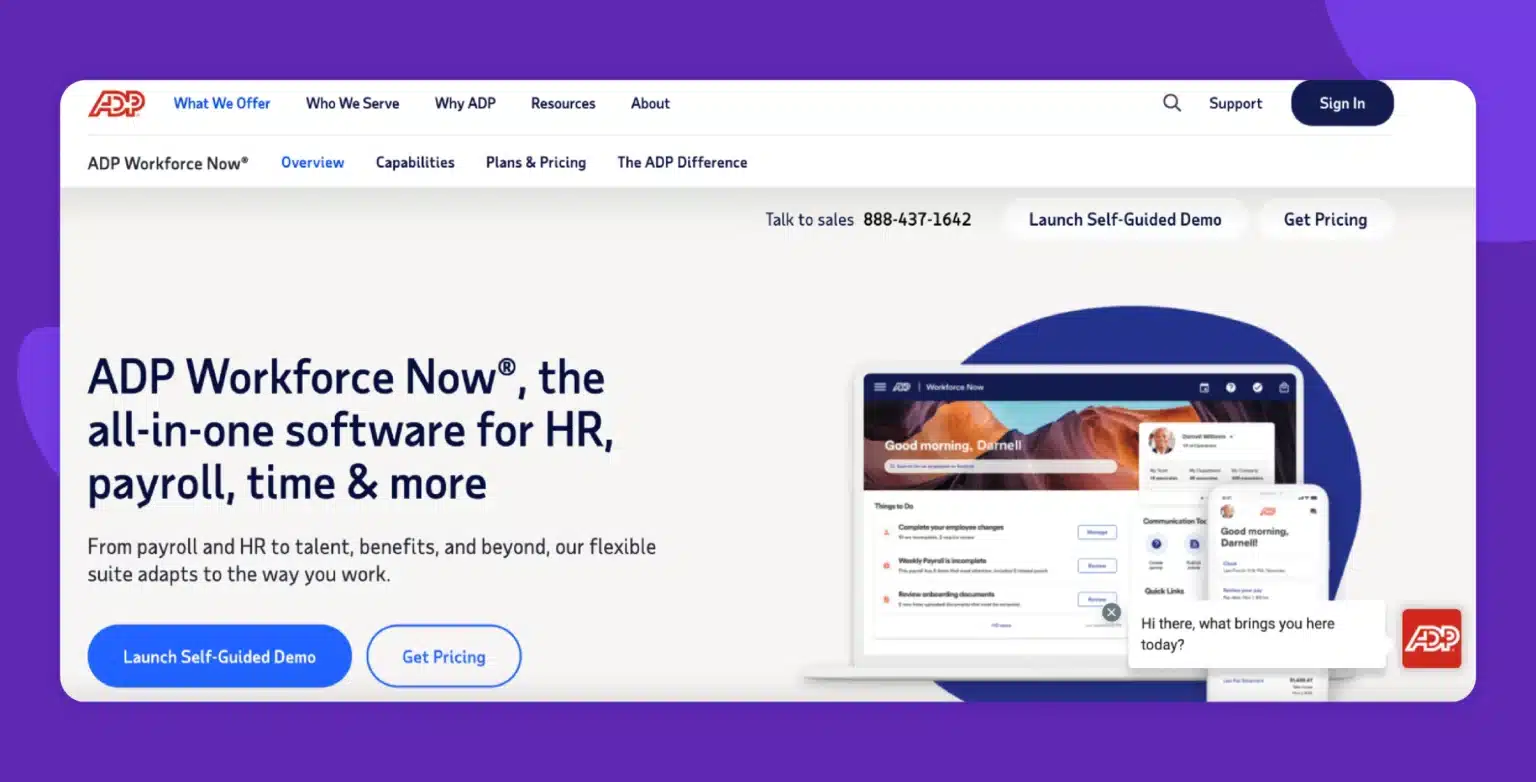
Key Features:
- Payroll Processing: Automated and accurate payroll services that ensure compliance with tax regulations.
- Talent Acquisition: Tools for recruiting, onboarding, and managing new hires seamlessly.
- Performance Management: Modules to set goals, conduct evaluations, and monitor employee performance.
- Benefits Administration: Streamlined management of employee benefits, including enrollment and tracking.
- Employee Self-Service: Allows employees to view their personal info, pay stubs, and time-off requests.
User Ratings:
Ideal For:
Organizations need a strong and flexible talent management system. It should combine core HR features with top-notch payroll and benefits management.
7. iCIMS Talent Cloud
iCIMS Talent Cloud is a complete recruiting platform. It helps organizations of any size make hiring easier.
It offers a suite of tools that enhance talent acquisition efforts, from sourcing candidates to onboarding new hires. iCIMS uses AI tools and easy integrations to improve recruitment workflows and hiring outcomes.
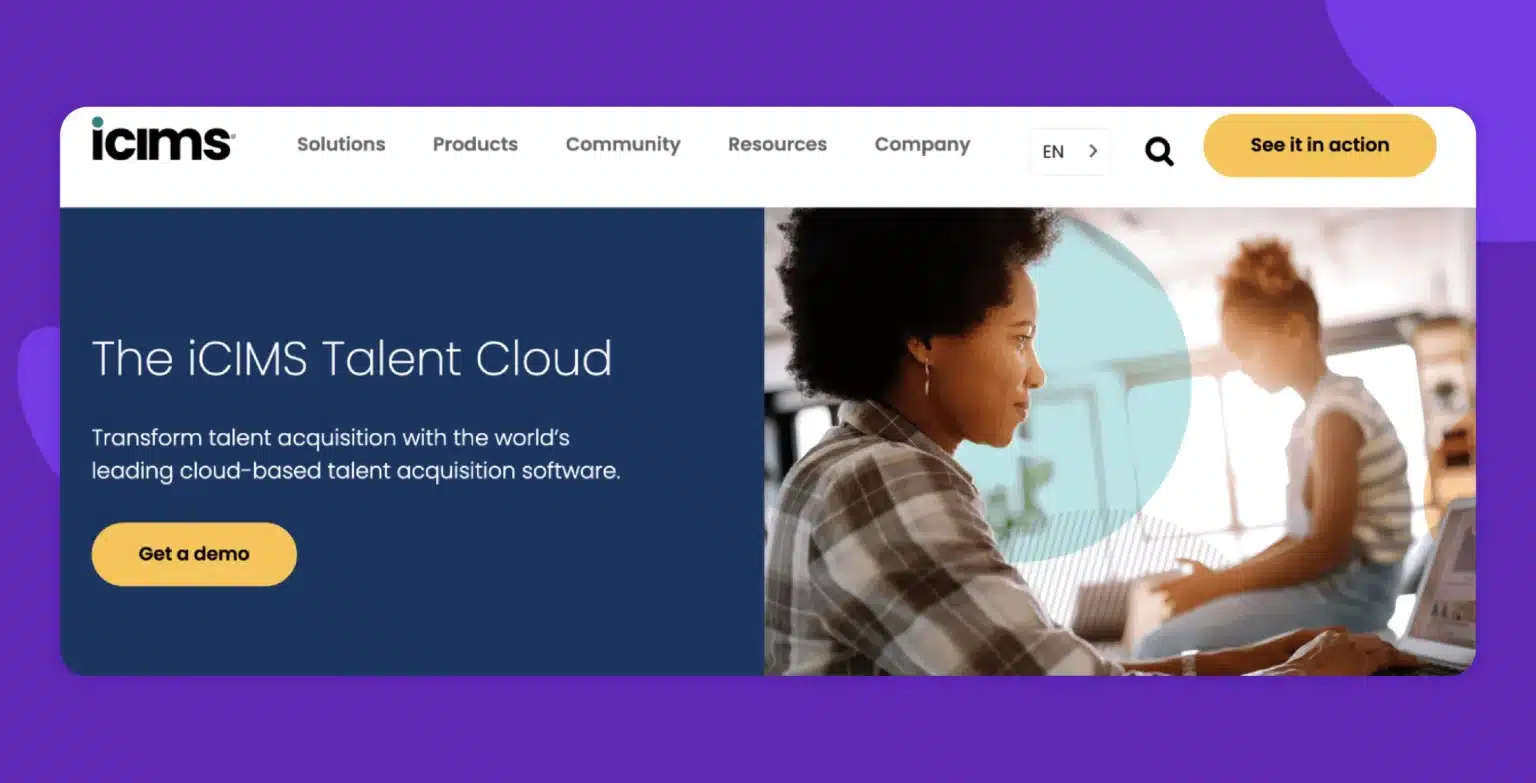
Key Features:
- Applicant Tracking System (ATS): It handles the whole hiring process. This includes posting job openings and tracking how candidates progress.
- Candidate Relationship Management (CRM): Builds and maintains a talent pool by nurturing relationships with potential candidates.
- AI Recruiting Assistant: Uses AI to screen resumes, match candidates to jobs, and simplify sourcing.
- Onboarding: Helps new hires adjust easily. It provides tools for managing documents, training, and fitting into the company culture.
User Ratings:
Ideal For:
Organizations focused on recruitment need a strong platform to improve their hiring processes.
8. JazzHR
JazzHR is a user-friendly talent management platform. It helps small and mid-sized businesses hire more easily.
It unites your hiring process. You get tools to track applicants, work with your team, and boost the candidate experience.
It offers customizable workflows and a user-friendly design. This helps you find and hire top talent quickly and easily, without the stress.

Key Features:
- Custom Workflows: Tailor the recruitment process to fit your organization’s unique hiring stages.
- Resume Parsing: Automatically extract candidate information from resumes to populate applicant profiles.
- Interview Scheduling: Coordinate interviews seamlessly with integrated calendar tools.
- Collaboration Tools: Enable team members to share feedback and make collective hiring decisions.
- Reporting and Analytics: Gain insights into hiring metrics to optimize recruitment strategies.
User Ratings:
Ideal For:
Startups and small to medium-sized businesses need a budget-friendly and efficient way to manage hiring.
9. Lattice
Lattice is a relaible talent management platform. It helps companies grow their people and boost performance together.
It helps boost engagement, development, and accountability. It offers tools for goal setting, continuous feedback, and performance reviews all in one place.
With an easy-to-use interface and smart analytics, it helps you align every employee’s growth with your company’s bigger goals.
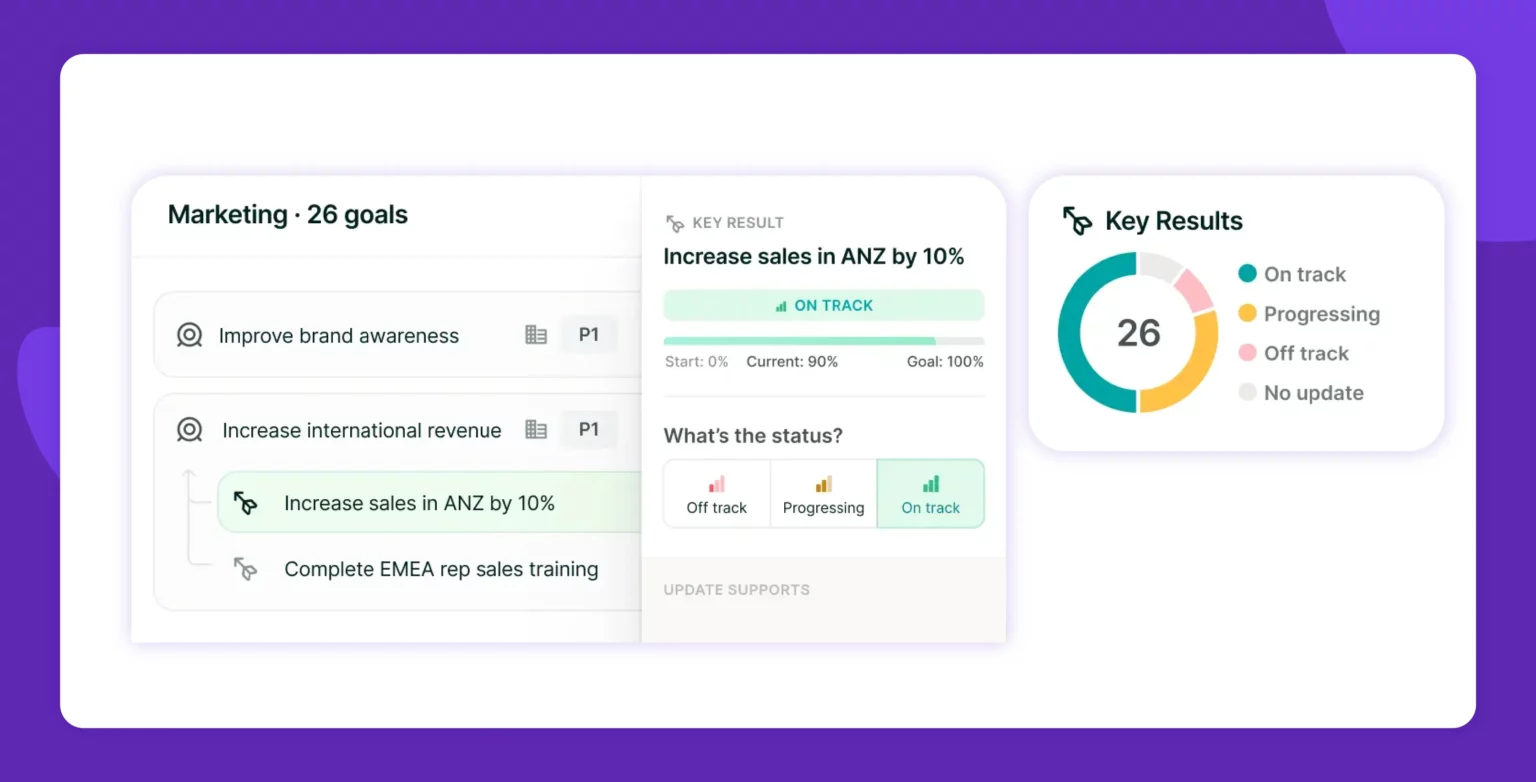
Key Features:
- 1:1 Meetings: Set up regular check-ins between managers and team members. This helps keep everyone aligned and address any concerns.
- Performance Reviews: Evaluate employee performance in a structured way. This helps find areas to improve.
- Engagement Surveys: Gauge employee satisfaction and engagement levels through customizable surveys.
- Goal Tracking (OKRs): Set and track objectives and key results. This helps align personal goals with the organization’s priorities.
- Analytics: Access comprehensive reports and dashboards to make data-driven HR decisions.
User Ratings:
Ideal For:
Organizations want to create a people-first culture. They focus on continuous performance management, employee engagement, and goal alignment.
10. Paycor
Paycor brings together HR, payroll, recruiting, and performance management. This creates a simple and effective talent management solution. Made for growing businesses, it makes tasks easier, boosts employee engagement, and changes as your team expands.
It is the platform you need. It simplifies people management and boosts performance.
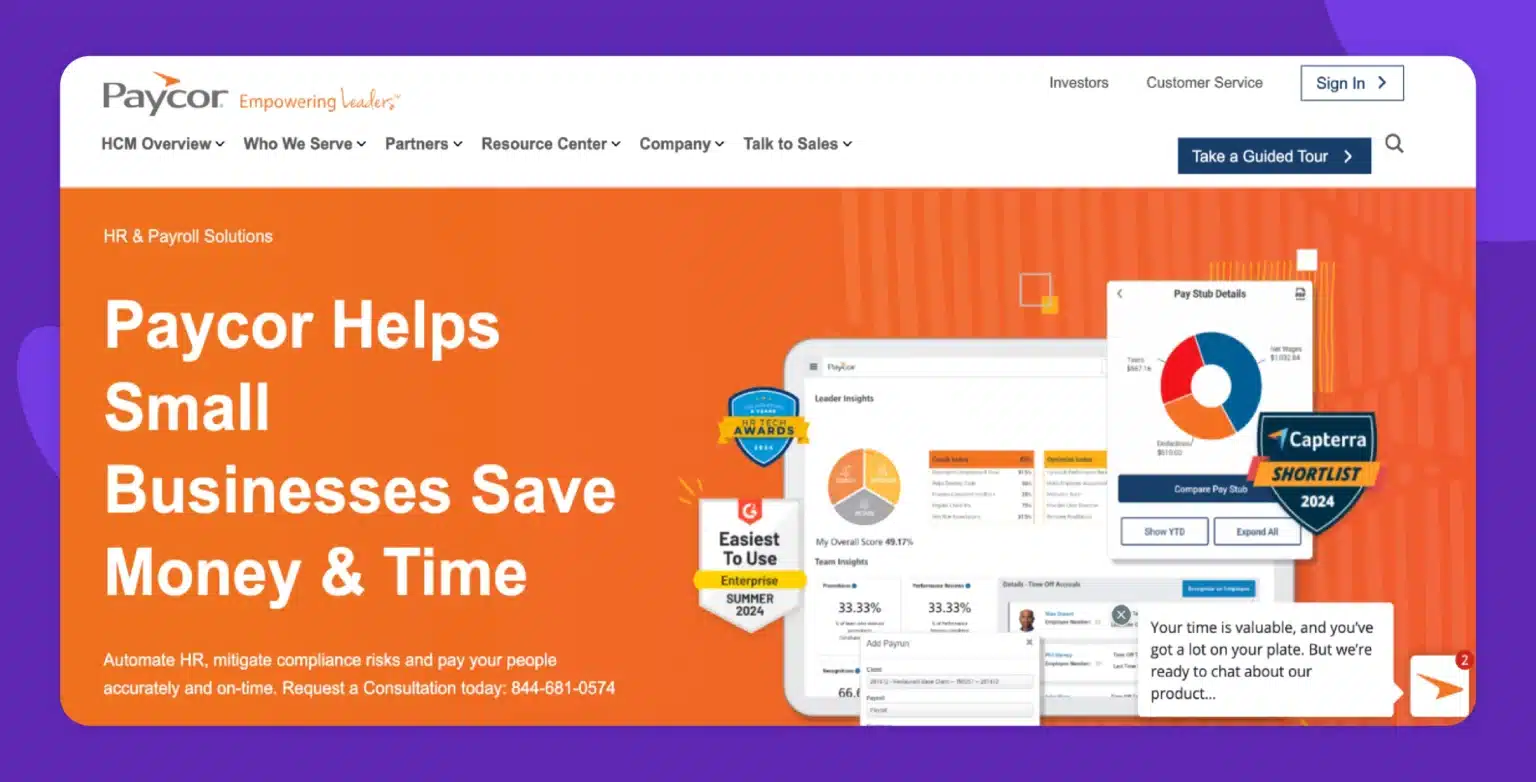
Key Features:
- Recruiting & Onboarding: Simplify talent acquisition with customizable workflows and seamless onboarding experiences.
- Payroll & Tax Compliance: Automate payroll to meet tax rules. This cuts down on admin work.
- Performance Management: Give regular feedback, set clear goals, and hold reviews to help employees grow.
- Learning Management: Offer training modules and track employee learning progress to support skill development.
- HR Analytics: Gain insights into workforce trends and metrics to inform strategic decision-making.
User Ratings:
Ideal For:
Growing businesses seeking an all-in-one platform to manage HR functions efficiently. Paycor’s scalable solutions are particularly beneficial for organizations aiming to streamline operations and enhance employee engagement.
11. ZipRecruiter
ZipRecruiter is a well-known recruiting and job posting platform built to simplify and speed up the hiring process. It uses strong AI matching tech to link employers with top candidates quickly. This cuts down the time and effort needed to fill open roles.
With a massive resume database and a user-friendly interface, it’s especially handy for companies hiring at scale.
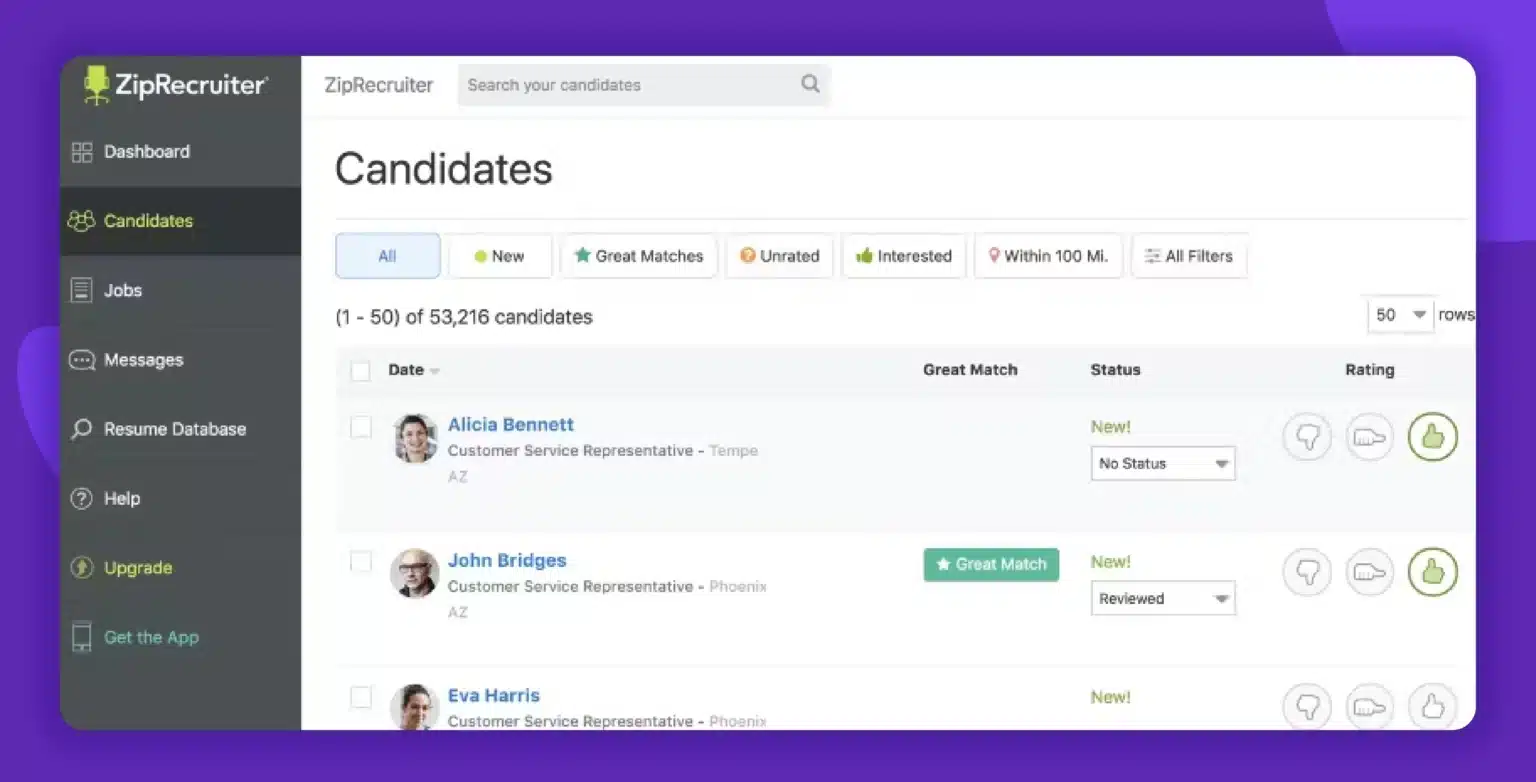
Key Features:
- AI Job Matching: Automatically finds and recommends the best candidates based on job requirements.
- Resume Database Access: Search millions of resumes to discover talent proactively.
- Job Posting Distribution: Post to 100+ job sites with a single submission.
- Interview Tools: Built-in tools help schedule interviews and track applicant progress.
User Rating:
Ideal For:
Companies of all sizes should pay attention. This is especially true for those that need fast, large-scale hiring, whether for one department or the whole company.
12. Monday.com
Monday.com is a versatile Work OS designed to help teams stay organized, aligned, and productive. It empowers project-driven teams with custom workflows, goal tracking, and performance dashboards.
It is great for businesses that need a flexible Talent Management System (TMS). It boosts team collaboration and offers tools to manage talent well during projects.
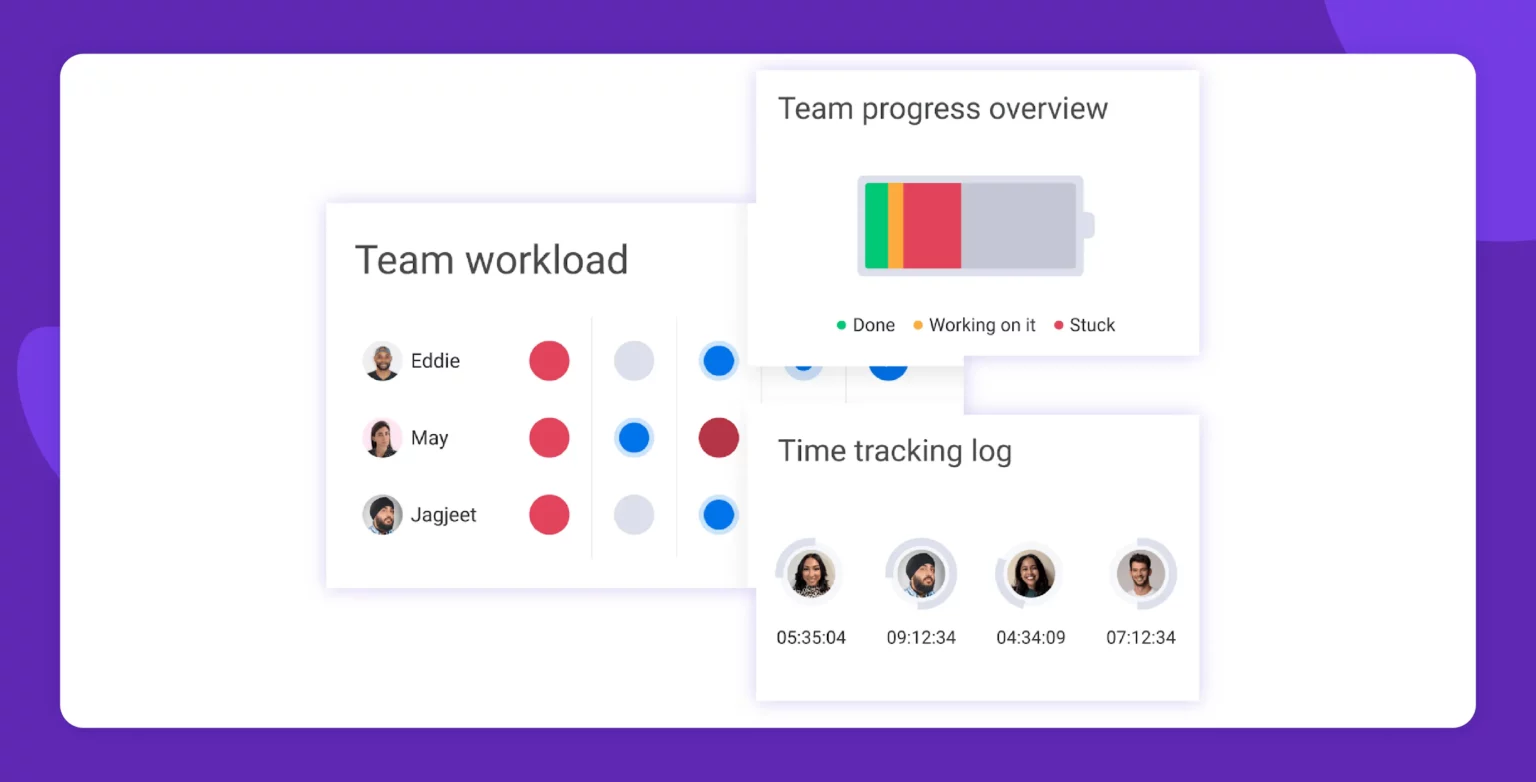
Key Features:
- Custom Workflows: Design workflows to fit your team’s unique processes and talent management needs.
- Performance Dashboards: Visualize team performance and goals with customizable dashboards that track progress.
- Integrations: Link up with popular apps like Slack and Google Drive. This helps make teamwork easier.
User Ratings:
Ideal For:
Teams want a flexible platform to manage goals, performance, and collaboration. This system is easy to use. Monday.com helps project teams align their goals and tasks well.
13. Gusto
Gusto is an intuitive payroll and HR platform tailored for small to medium-sized businesses (SMBs). It simplifies complex tasks like payroll, onboarding, benefits, and compliance. This makes it an easy-to-use solution for growing teams.
It allows business owners to focus on what matters most growing their business while it takes care of the HR heavy lifting.
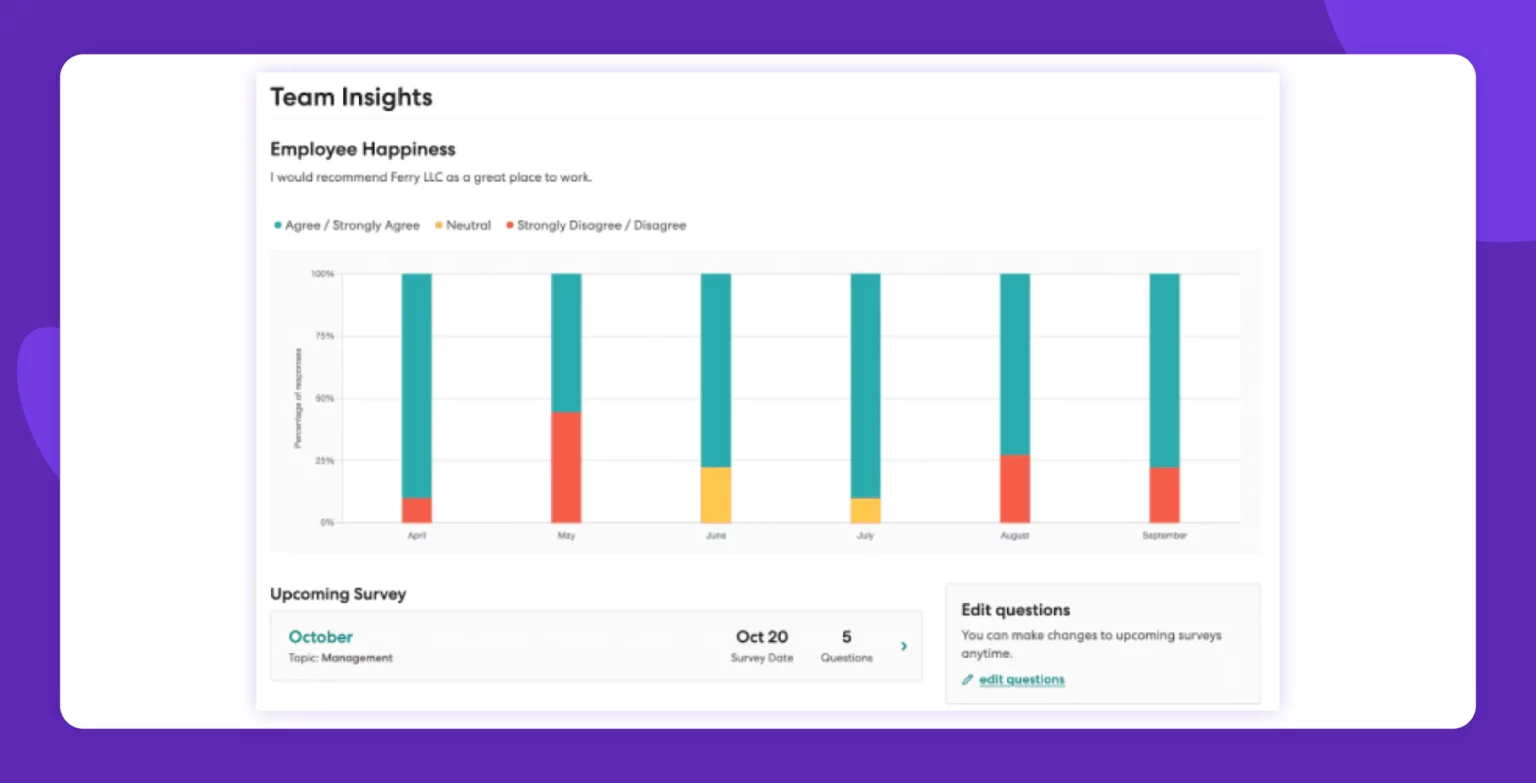
Key Features:
- Payroll: It calculates, files, and pays taxes automatically. This ensures timely and accurate payroll processing.
- Onboarding: Offers digital onboarding to streamline the process for new hires.
- Benefits Management: Provides access to employee benefits, including health insurance and retirement plans.
- Compliance: Ensures compliance with federal and state laws, reducing the risk of penalties.
User Ratings:
Ideal For:
Small businesses need a simple way to handle key HR tasks. This includes payroll, compliance, and employee benefits. They want a solution that isn’t complicated or too expensive like bigger platforms.
14. Paylocity
Paylocity is a cloud-based HR and payroll tool. It aims to simplify key HR tasks. These include talent management, payroll processing, benefits administration, and employee learning.
This all-in-one platform is ideal for midsize companies. It modernizes HR processes with advanced tools and easy-to-use features. This helps them stay competitive and compliant.
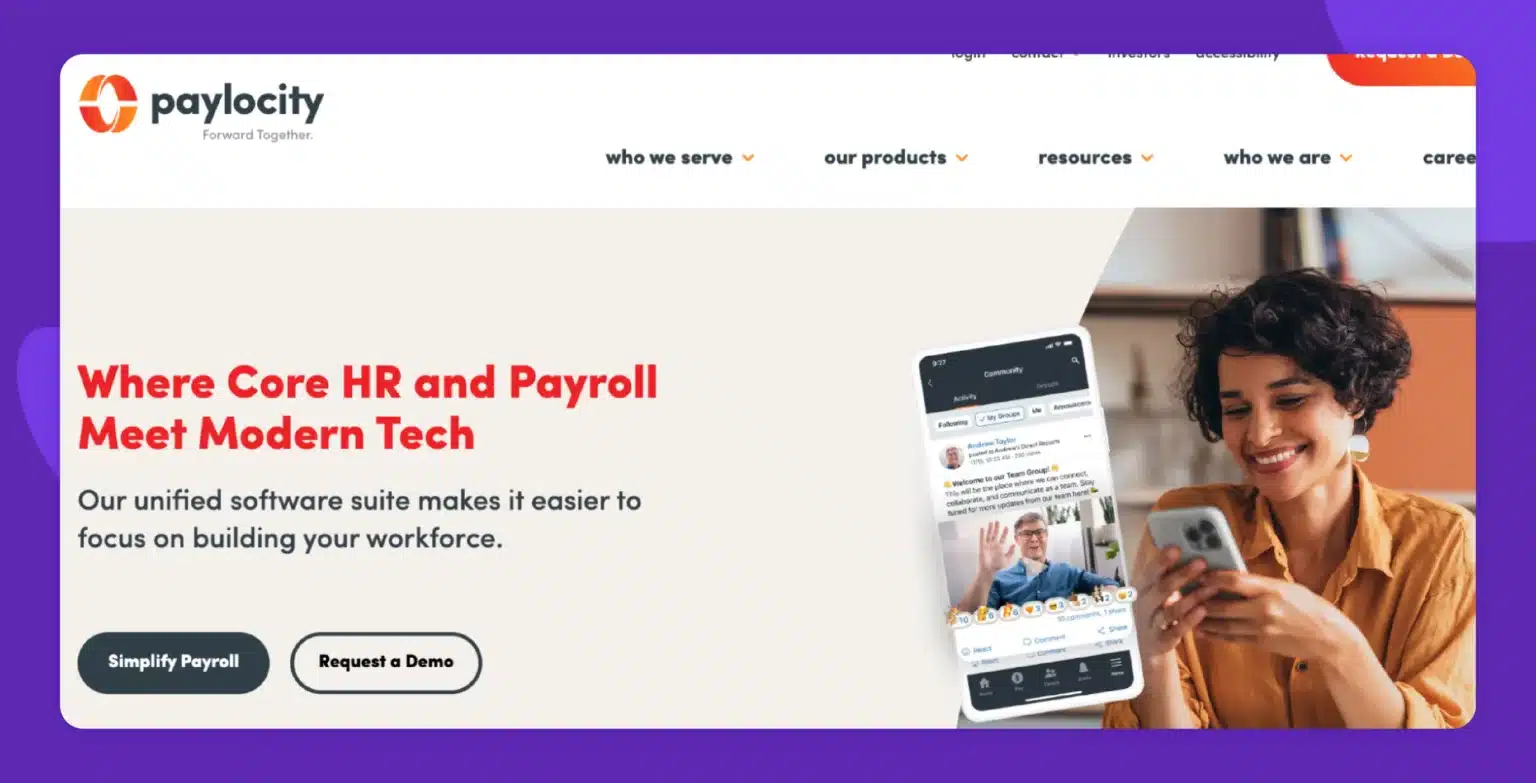
Key Features:
- Talent Management: Tools to manage employee performance, goals, and development.
- Payroll: Automated payroll processing that ensures timely and accurate payments.
- Benefits Administration: Easy management of employee benefits, from health insurance to retirement plans.
- Learning & Development: Provides resources to support employee training and professional growth.
User Ratings:
Ideal For:
Midsize companies want to modernize HR, automate tasks, and boost employee experience. They also aim to drive growth in their organization.
15. Paycom
Paycom is a self-service HR and talent management platform that puts the power of HR in employees’ hands.
It makes HR easier for organizations. It offers tools for payroll, time tracking, and performance management all in one place. It’s great for companies that want to improve efficiency. It helps employees take charge of their own data.
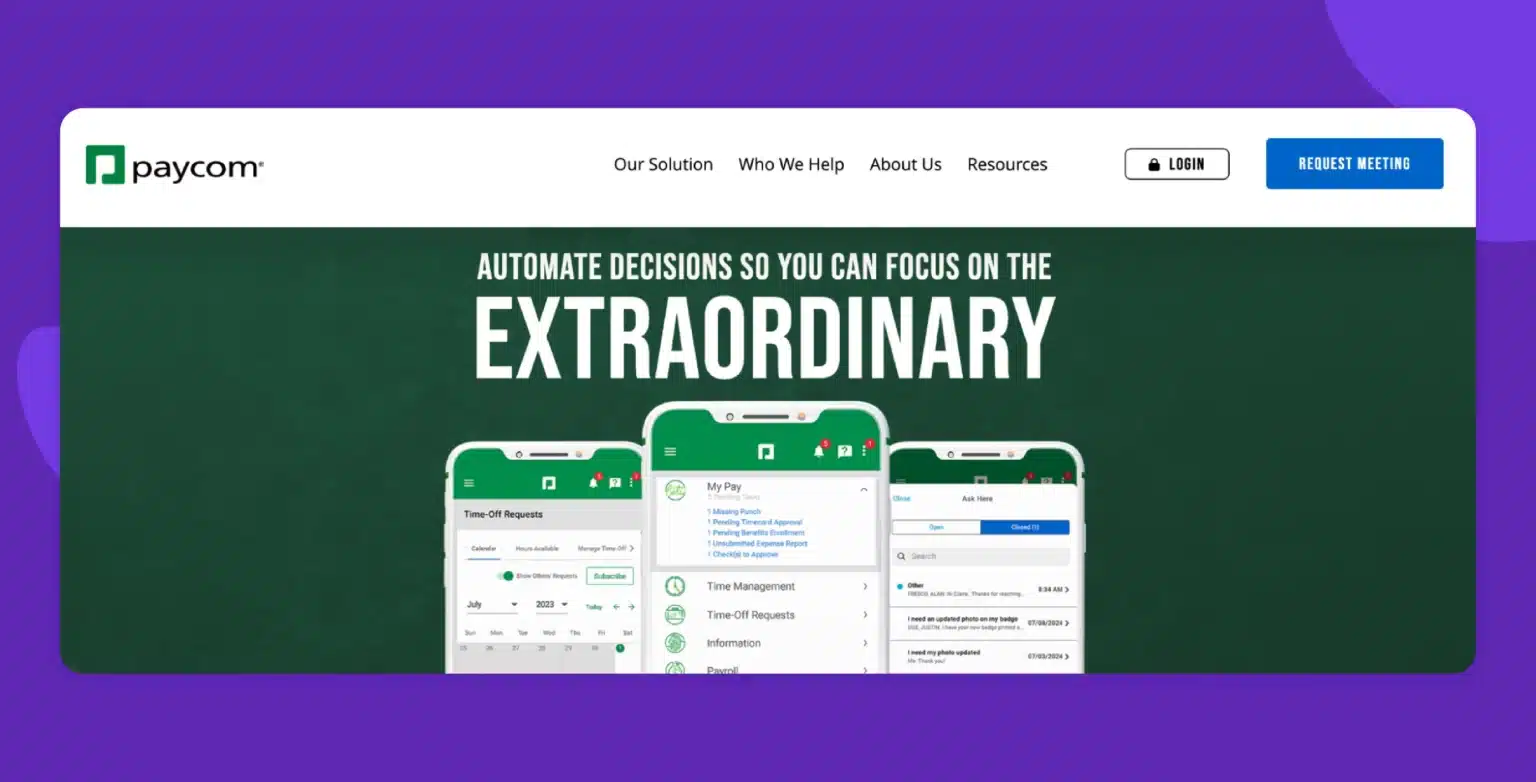
Key Features:
- Payroll: Fast, accurate payroll with real-time visibility and employee-managed entries.
- Time Tracking: Integrated time and attendance with scheduling, labor cost reporting, and compliance tracking.
- Performance Reviews: Built-in tools to support goal setting, performance evaluations, and ongoing feedback.
User Ratings:
Ideal For:
Companies that are mid-sized or large can simplify HR tasks. They can also encourage employee self-service. This way, they don’t depend too much on HR teams for daily admin work.
16. isolved
isolved is a complete Human Capital Management (HCM) platform. It’s designed for small to mid-sized businesses. This system helps combine HR, payroll, and talent processes into one modern solution.
It helps companies automate admin tasks. This also improves the employee experience, from onboarding to performance and learning.
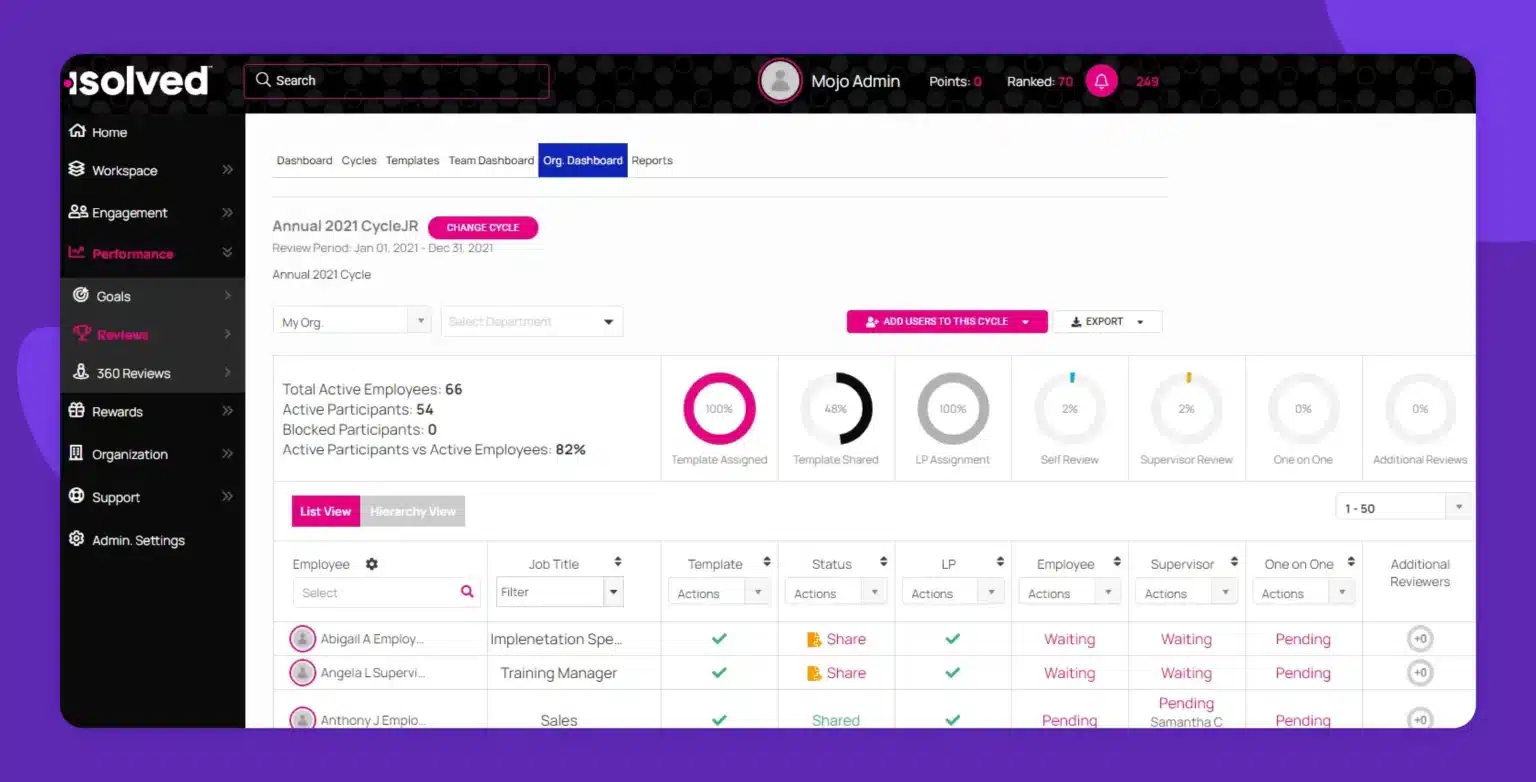
Key Features:
- HR & Payroll: Manage employee data, automate payroll, and ensure compliance in one place.
- Benefits Administration: Simplifies enrollment, eligibility tracking, and reporting.
- Performance & Learning: Provides tools for goal setting, feedback, and employee development.
- Onboarding & Engagement: This helps new hires settle in quickly. It also keeps employees engaged while they work at the company.
User Ratings:
Ideal For:
Fast-growing SMBs need a scalable, all-in-one HR and talent management solution. This helps them meet changing workforce demands.
17. Workable
Workable is a recruiting and applicant tracking system (ATS) that helps teams hire faster and smarter together.
With tools that support every stage of the hiring process, from job posting to offer letter, Workable is built for teams that hire frequently and value collaboration. It’s especially helpful for fast-growing companies needing to scale without sacrificing quality.
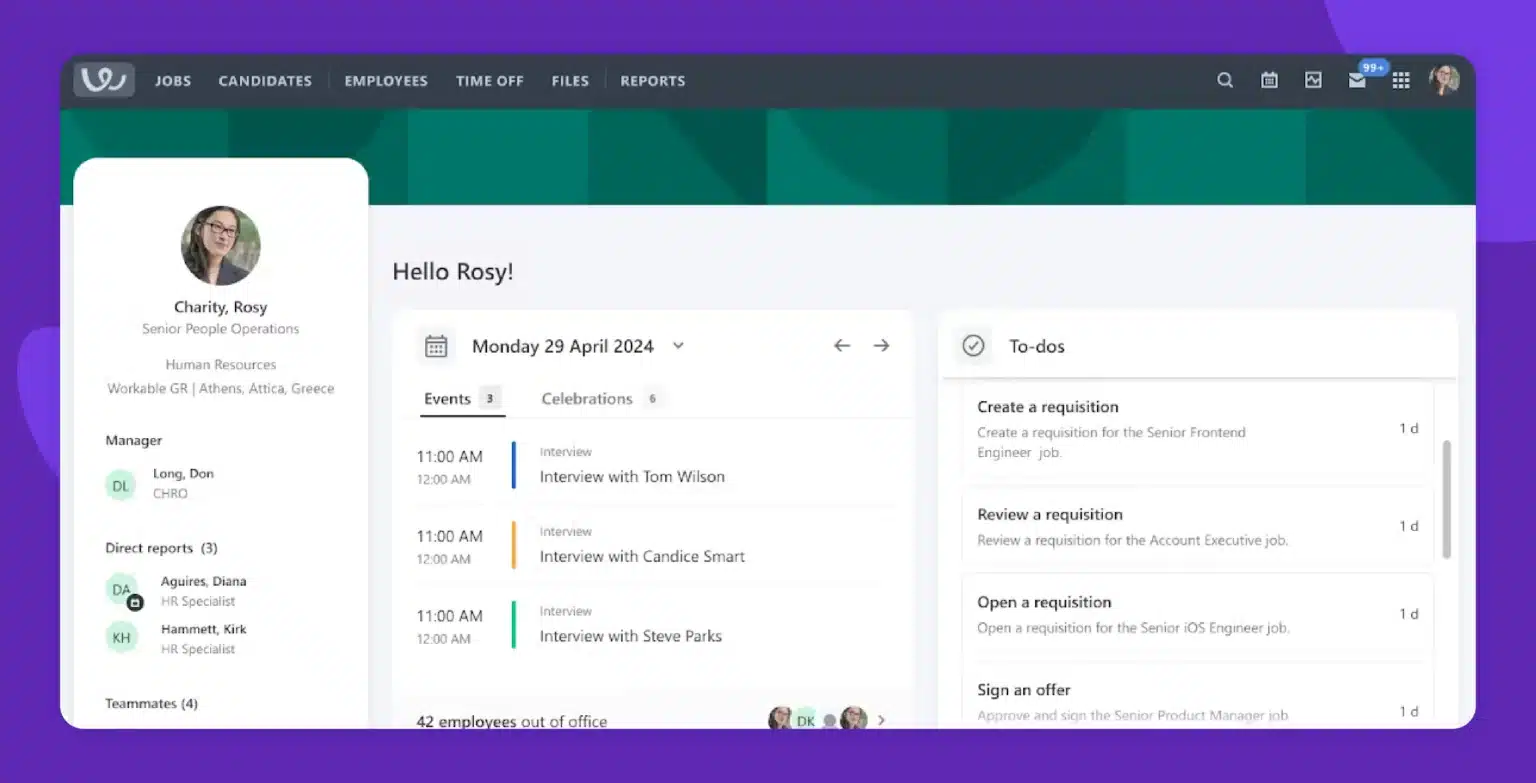
Key Features:
- ATS: Intuitive applicant tracking with drag-and-drop pipeline management.
- Job Board Integrations: One-click posting to 200+ job boards, including LinkedIn and Indeed.
- Interview Tools: Structured interview scorecards, scheduling, and evaluations.
- AI-Powered Sourcing: Automatically finds passive candidates that match your job description.
- Collaboration Features: Internal commenting and candidate rating tools to streamline team decision-making.
User Ratings:
Ideal For:
Teams of any size that are scaling fast and need a collaborative hiring platform that’s both powerful and easy to use.
18. Rippling
Rippling is a all-in-one platform for HR, IT, and finance. It’s popular among fast-growing companies that want everything in one spot.
It makes it easy to onboard employees, run payroll, manage benefits, and ship laptops to new hires. It automates everything for you. It’s built for scale and speed, making it a top pick for tech-forward businesses.
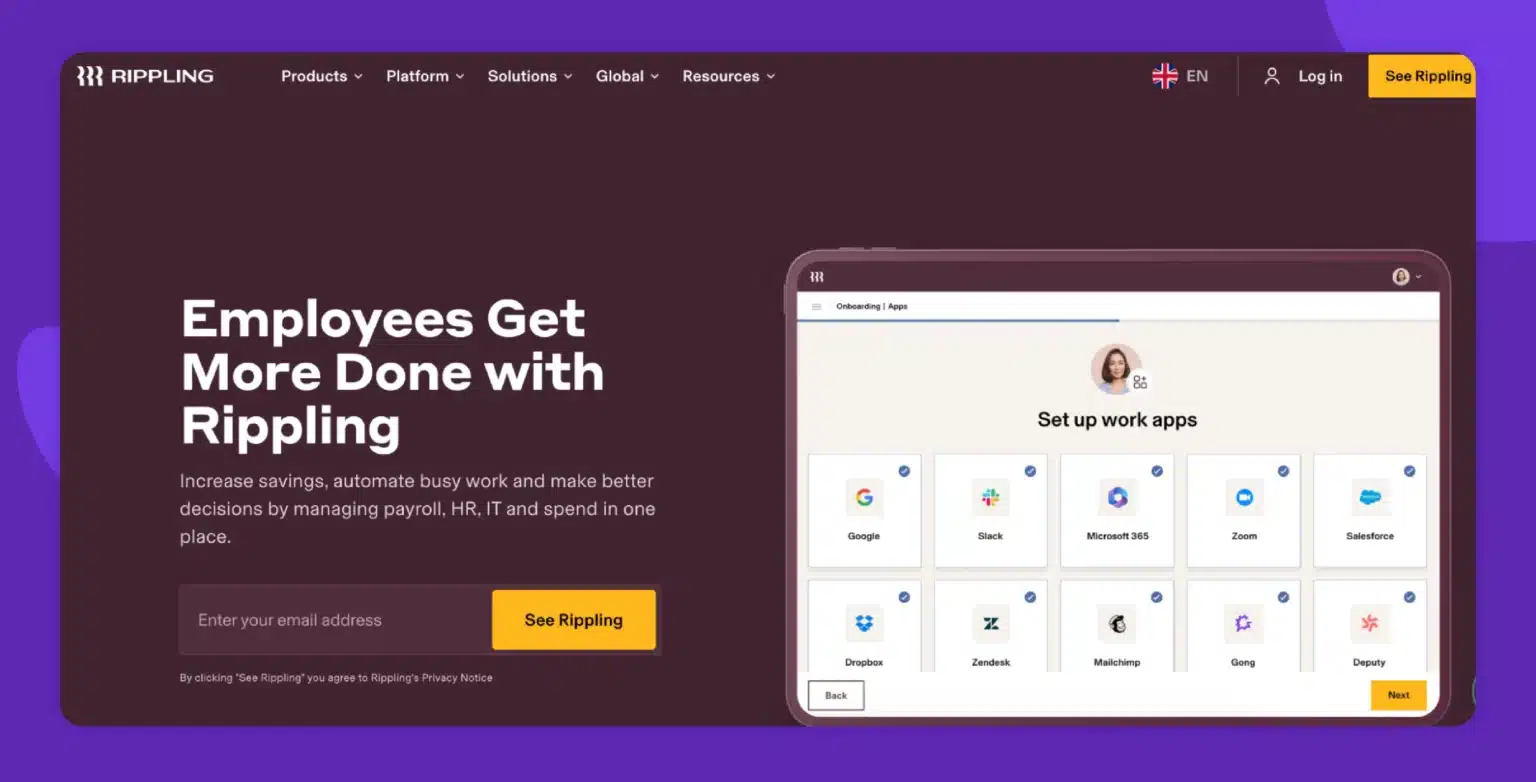
Key Features:
- HRIS & Payroll: Seamlessly manage employee data, run payroll in minutes, and stay compliant.
- IT Automation: Instantly assign apps, set up devices, and manage security for remote and hybrid teams.
- Org Charts & Reporting: Visualize team structures and run detailed analytics on your workforce.
- Benefits & Time Tracking: Streamlined enrollment and attendance tools that sync with payroll.
- Global Workforce Management: Hire, pay, and manage international workers or contractors all in one place.
User Ratings:
Ideal For:
Tech-savvy companies that want to streamline HR, IT, and finance processes can do so without using many different tools.
19. Deel
Deel is a global HR and payroll platform designed to make international hiring a breeze. Deel makes hiring easy. We take care of everything for full-time employees and contractors in 150+ countries. This includes contracts, compliance, benefits, and payments.
It’s great for remote-first companies. They can scale globally without legal or operational issues.
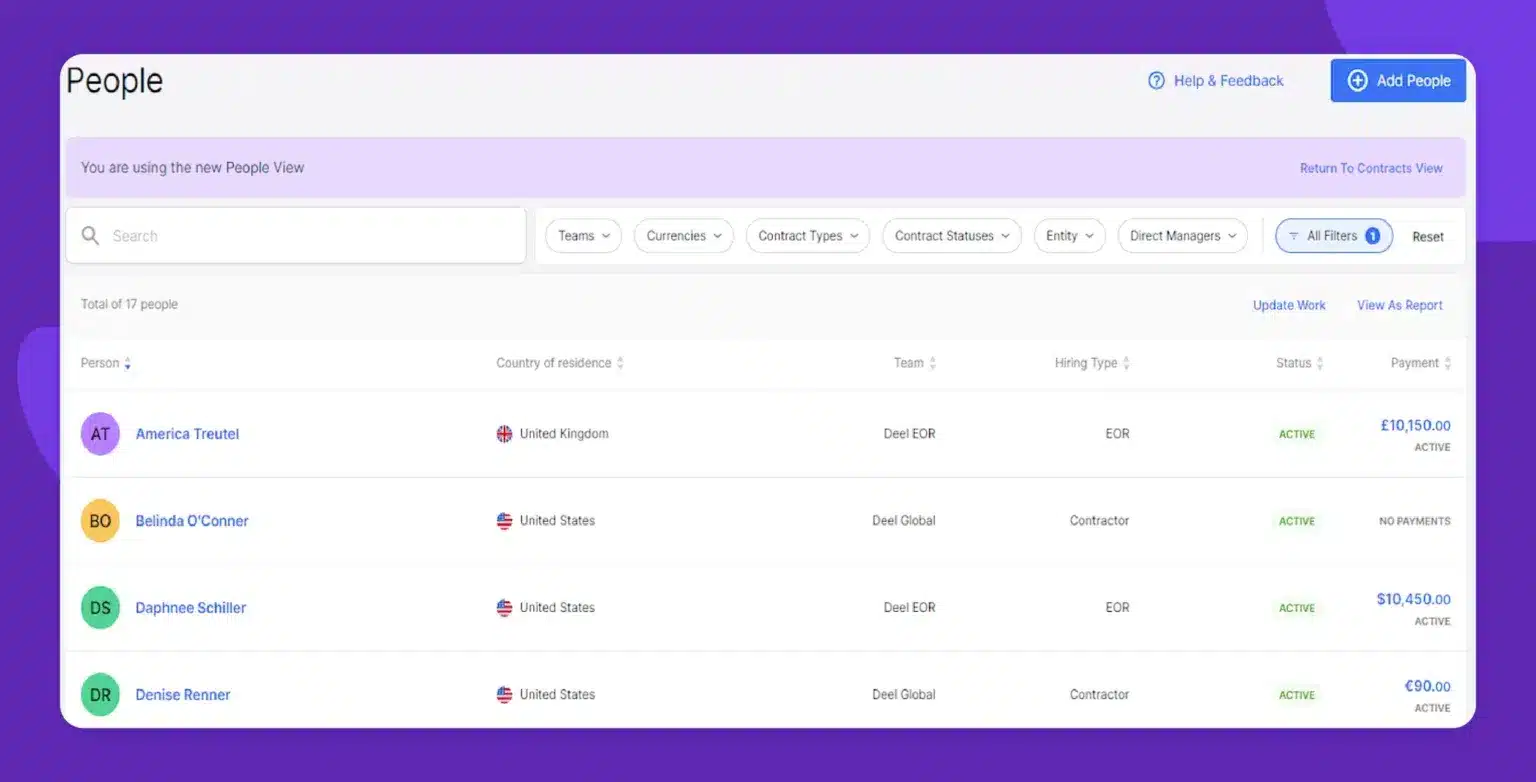
Key Features:
- EOR (Employer of Record): Hire full-time employees in countries where you don’t have an entity.
- Contractor Management: Automate onboarding, payments, and compliance for freelancers worldwide.
- Global Payroll: Pay teams in over 100 currencies with local tax and labor law compliance.
- Benefits Administration: Offer localized benefits packages, even across borders.
- Legal & Compliance Support: Built-in protections and templates for global hiring.
User Ratings:
Ideal For:
Remote-first companies hire across borders. They want a simple, compliant way to manage payroll and HR.
20. Remofirst
Remofirst is a fast-growing Employer of Record (EOR) and global HR platform. It helps businesses hire international employees without needing local entities.
It offers a simple, affordable solution for managing global payroll, compliance, and onboarding all in one place. If you’re expanding your team across borders and want a no-fuss, budget-friendly option, Remofirst is a strong contender.
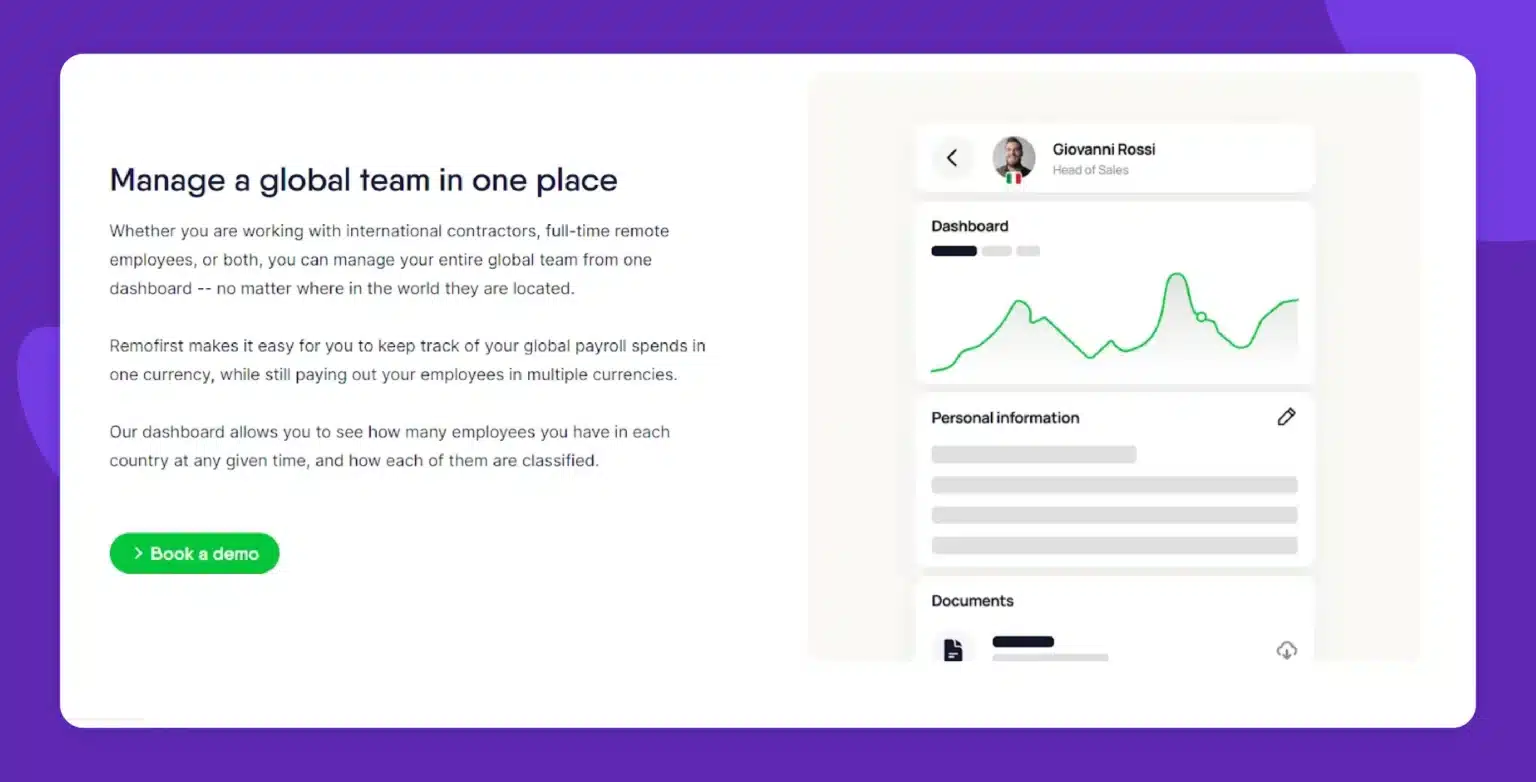
Key Features:
- EOR Services: Hire full-time employees in 180+ countries through Remofirst’s legal entities.
- Global Payroll: Process multi-currency payroll with full compliance and local tax handling.
- Contractor Payments: Easily manage and pay international contractors.
- Compliance & Documentation: Automated local contracts, benefits, and labor law compliance.
- Onboarding & Support: Streamlined setup with localized onboarding and 24/7 customer service.
User Ratings:
Ideal For:
Startups and growing companies can hire globally without the hassle of setting up entities. This is great for lean teams managing workers from different locations.
| Struggling to Pick the Right Talent Management Software? Get clarity with our Talent Management Software Evaluation Template. This user-friendly PDF helps you compare features, pricing, and benefits across platforms, so you can make a confident, informed decision. Bonus: Don’t miss our guide on [Effective Performance Evaluation Methods] |
How to Choose the Best Talent Management Software for Your Organization
Still feeling confused? Finding the right talent management software can be overwhelming, especially with so many options available. Are you considering the specific needs of your industry?
Does the software offer the level of customization required for your unique processes? Have you asked vendors the right questions to ensure you’re selecting the best platform? And, do you understand the implementation timeline and how it will affect your team’s workflow?
The right talent management software can transform the way your organization attracts, develops, and retains top talent. With hundreds of platforms out there, it’s essential to take a strategic approach.
Here’s a curated guide to help you confidently select the best talent management system for your business needs.
1. Consider Your Industry and Customization Needs
No two businesses are the same, your talent strategy should reflect that. Whether you’re in healthcare, tech, or retail, choose a talent management platform that caters to your specific industry requirements and can be tailored to your company culture.
Industry-specific features:
- Healthcare: Prioritize tools that ensure regulatory compliance, credential tracking, and clinical performance management.
- Retail: Focus on sales metrics and flexible scheduling for seasonal staff.
Customization capabilities:
Can the software be customized? Does it fit your company’s workflows, structures, and performance models? A great talent management solution should fit into your existing ecosystem, not force you to change your entire process.
Flexibility and scalability:
Your business will evolve and your talent management system should evolve with it. Pick a solution that grows with you. It should have scalable modules and customizable data dashboards. This way, you can make quick decisions easily.
2. Ask Vendors the Right Questions
Don’t just rely on sales demos. Ask targeted questions to uncover how the software will truly perform for your business:
How frequent are your updates, and how do they affect workflows?
Ensure upgrades improve functionality without disrupting daily operations.
What kind of training and ongoing support do you offer?
Implementation is only the beginning. Solid customer support ensures long-term success.
Can your platform scale with our company?
Opt for a talent management tool that grows with you whether you’re onboarding 50 or 5000 employees.
| Deliver Seamless Onboarding—Every Time Give every new hire a smooth, structured start with the help of your Talent Management System. Download our Employee Onboarding Checklist Template A practical, step-by-step guide to help HR teams manage tasks, delegate ownership, and fully leverage your TMS from day one. Also check out: [Employee Onboarding Checklist ] |
Does it integrate with our current HR tech stack?
Easy integration with payroll, HRIS, and collaboration tools stops data silos and saves time.
Can we get a demo or trial to explore the user experience?
You want a platform that’s intuitive for both admins and employees. The better the UX, the higher the adoption rate.
3. Understand the Implementation Timeline
A key factor often missed in picking the right talent management software is implementation.
Set realistic timelines:
Rolling out new software takes time especially if your systems are complex or outdated. Map out your goals and work backward to establish clear phases.
Align with vendor capabilities:
Ask vendors for case studies or timelines for companies of your size and industry. You need a partner who can meet your timeline without cutting corners.
| Plan a Successful Talent Management System Rollout Lay the groundwork for a smooth implementation with a clear strategy, defined goals, and a trackable roadmap. Download our Talent Management Implementation Plan Template Build a customized, step-by-step plan with timelines, ownership, and milestones to ensure your TMS launch stays on track. |
4. Evaluate Integration Capabilities
According to Asana, workers toggle between apps 25 times per day and a third feel it hurts their productivity. Your talent management platform should integrate seamlessly with the tools your team already uses.
Look for systems that:
- Sync with your HRIS, payroll, and performance tracking tools.
- Enable single sign-on (SSO) and offer open APIs for flexibility.
- Centralize data to eliminate double entry and prevent errors.
Smooth integration leads to smoother operations and higher efficiency.
5. Ensure Accurate Analytics and Reporting
In today’s data-driven workplace, a talent management solution is only as good as the insights it provides. Analytics are critical for tracking performance, identifying gaps, and forecasting HR needs.
Look for platforms that:
- Offer real-time dashboards and custom reporting.
- Provide visibility into key metrics like turnover, goal attainment, and hiring efficiency.
- Are user-friendly—even for non-technical HR leaders.
Data transparency empowers better decisions and measurable ROI.
Ready to Take the Next Step in Talent Management?
Managing talent is an ongoing process that requires continuous focus on growth, alignment, and engagement. The right talent management platform should do more than just handle administrative tasks; it should give you real-time insights to make informed decisions and drive your team’s success.
So, what’s next? Choose a solution that empowers your team and helps you focus on what matters most: building a motivated, high-performing workforce. A great talent management system allows you to streamline processes while nurturing your team’s growth.
Peoplebox.ai helps you achieve this with tools for OKRs, pulse surveys, continuous feedback, and performance reviews—all in one platform. It’s not just about collecting feedback; it helps you take action on it, ensuring real results. With integrations to Slack, Teams, Jira, and more, Peoplebox fits seamlessly into your existing workflow.
Ready to align, engage, and grow your team? Book a demo today and see how Peoplebox.ai can help you unlock your team’s full potential. Investing in the right platform is investing in the future success of your people and your business.
Frequently Asked Questions(FAQs)
What is talent management software?
Talent management software is a tool designed to streamline and enhance various HR functions related to employee recruitment, development, performance, and retention. It offers features like goal setting, performance reviews, training management, and succession planning, helping organizations optimize their workforce and align employee performance with business objectives.
What Are the 3 C’s of Talent Management?
The three key pillars of talent performance—Competency, Commitment, and Contribution are essential and interconnected. Focusing on these “3 Cs” helps organizations build strong, high-performing teams while fostering a culture of ongoing growth, engagement, and innovation.
What are the 4 Pillars of Talent Management?
Talent management is built on four key pillars: Talent Acquisition, Development, Engagement, and Retention. Together, they help attract, grow, and keep top talent.
- Talent Acquisition – Find and hire the right people through strong employer branding and smooth onboarding.
- Talent Development – Grow skills with training, coaching, and career opportunities.
- Employee Engagement – Build a culture where people feel valued, connected, and motivated.
- Retention – Keep top talent by meeting their needs and offering competitive rewards.
What are the 4 B’s of Talent Management?
To make any talent strategy truly effective, it needs support across the entire organization. Be strategic, be inclusive, and make the most of the resources available to you. And remember the 4 B’s of talent development: Build (grow talent from within), Buy (hire new talent), Borrow (bring in external expertise), and Bridge (help employees move into new roles or skill areas).
How does talent management work?
Talent management involves a systematic approach to recruiting, developing, and retaining employees to achieve organizational goals. It includes setting clear performance objectives, providing ongoing training and development, conducting regular performance reviews, and planning for future leadership needs. This holistic approach ensures that the right talent is in place and motivated to drive company success.
What is the future of talent management?
The future of talent management is expected to be shaped by advancements in artificial intelligence, data analytics, and remote work technologies. Companies will increasingly rely on predictive analytics to anticipate workforce needs and automate routine tasks. Personalized employee experiences, enhanced by AI-driven insights, will become central to attracting and retaining top talent.
Why is talent management important to HR?
Talent management is crucial to HR departments because it helps attract, develop, and retain the best employees, ensuring they are aligned with the organization’s strategic goals. Effective talent management improves employee engagement and performance, reduces turnover, and supports a positive workplace culture, ultimately driving organizational success and competitiveness.






